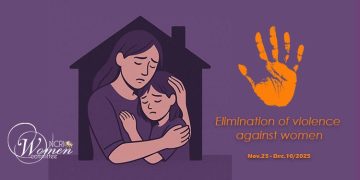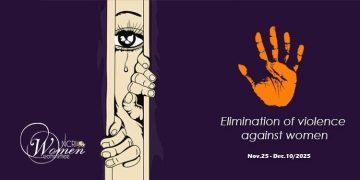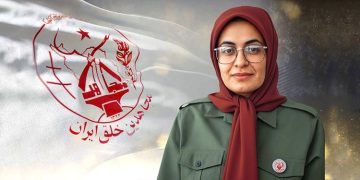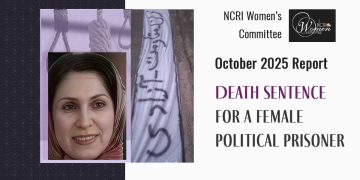In Hot Air, Hollie McKay interviews Aziz Rezaee, a shining star in the struggle of Iranian women under both the Shah and the clerical regimes. Excerpts of this interview appear below:
Decades of Resilience: One Woman’s Harrowing Tale of Torture Under the Shah Sheds Light on Iran’s Dark History
PARIS, France – Fifty years later, anti-Iranian regime activist Aziz Rezaee still bears the scars of torture on the bottoms of her frail feet. Yet, the 96-year-old’s years of abuse and political imprisonment stemmed not from the iron fist of the Mullahs but from their predecessor, Mohammad Reza Shah Pahlavi, revealing the underbelly of an Iranian epoch often romanticized by history as a bastion of freedom and progress.

“Iran was a beautiful place – but only for the very rich, not for the vast majority of Iranians, and that was the story of the Revolution,” Aziz tells me from her small apartment on the periphery of Paris. “And there was only one party – there could be no opposition.”
Born Zahra Norowzi in 1929 in Tehran, Aziz – a better-known moniker that translates to “dear” –married and gave birth to the first of nine children at age fourteen, a son named Hassan, who succumbed to pneumonia shortly after childbirth.
However, such tragedy only marked the beginning of what was to come.
Her nation’s heartache, Rezaee asserts, took hold in the early 1950s with the western-engineered overthrow of Iran’s first democratically elected Prime Minister, Mohammad Mossadegh, who nationalized Iran’s oil industry. This act, along with other nationalist policies and Western fears of communism, led to a 1953 CIA and MI6-backed coup codenamed TPAJAX and Operation Boot, respectively, which toppled Mossadegh and restored the Shah as the sole power rather than a symbolic leader.
“Then my son Ahmad, in high school, became engaged in (opposition) politics,” Aziz recalled. “And that is when our lives really changed.”
In the following years of turmoil, Aziz would lose a total of three sons and two daughters to the regimes of Iranian oppression – four under the Shah and one under the Ayatollah. The Shah’s men also killed one son-in-law as did the mullahs.

Their transgression? Belonging to the People’s Mojahedin Organization of Iran (MEK), an opposition outfit formed in 1965. Perhaps the most significant transgression of the Shah’s time was his creation and oversight of the secret police force SAVAK (Sazeman-i Ettelaat va Amniyat-i Keshvar) formed after his consolidation of power. This robust internal security force brutally cracked down on those perceived as defying formal or informal government policies.
After months of torture and an eventual escape from prison, Aziz’s son Reza was killed on June 15, 1973, amid a street clash with the SAVAK, and another son Ahmad was slain under similar circumstances eighteen months earlier. In 1975, her daughter Sedigheh was also gunned down by the SAVAK as she tried to evade arrest. In many ways, Aziz acknowledged, it was easier to cope with the knowledge that her children would never again have to weather barbarity under the SAVAK’s fist.
As opposition figures will attest, from 1963 to 1979, the Shah’s reign in Iran was characterized by strict measures to suppress political dissent. Thousands of political dissidents were tortured or executed, and reforms like women’s suffrage alienated traditional Muslims.
This climate of fear extended even to Iranian students abroad, according to Amnesty International, as the Shah’s SAVAK dedicated a disturbing number of agents to spy on the estimated 30,000 Iranian students in the United States, highlighting his paranoia and the lengths he’d go to control any potential opposition. Amnesty reports also pointed to unfathomable torture at the hands of the SAVAK – from electric shocks and boiling water pumped into one’s rectum to rape with a broken bottle and the extraction of nails and teeth.

Further, individuals considered political prisoners after 1972 were ushered into secret military tribunals, whereby guilt or innocence was determined solely with evidence compiled by the SAVAK, and defendants were not entitled to legal representation.
One exception was Aziz’s son Mehdi, who was arrested in May 1972.
“They would make him lie on a bench, and they heat the underneath, so the metal becomes burning hot, and they continue to burn his skin,” Aziz said, flinching at the memory of seeing her young son in such a state. “They also pulled out his fingernails.”
Amnesty International reports verified that such methods were used.
After three months, Aziz continued, Mehdi fooled the SAVAK into making his trial public – a rare occurrence – vowing to speak out against the MEK, which would provide coveted fodder for the regime. However, he did just the opposite: revealing his heinous treatment and commitment to the cause of standing up for the very poor in the country ruled by jarring extravagance. Foreign journalists were also in the audience – further infuriating the Shah’s government. Mehdi was thus subject to even more intense affliction.
“I hope God will take care of you, and I am proud of you,” Aziz remembers telling her frail son in their last embrace.
Mehdi was later executed by firing squad. He was 19.
Aziz’s home emerged as something of a hub for all the families whose loved ones were either confined or killed by the Shah’s forces, providing hope and communal comfort. Further, Aziz’s entire family spent time behind bars under the Shah, including the matriarch herself, who was also thrown in prison by the SAVAK from 1975 to 1977– enduring repeated floggings and hangings by her ankles, solitary confinement and a covert trial that ultimately led to a three-year sentence. Her husband was simultaneously detained.
“The guard would put his boot in my mouth and stand on my neck, suffocating me,” Aziz remembers, exposing her bare feet, still etched with scars. “I would hear the screams of people having limbs amputated – especially fingers. They (the guards) would beat us and hang us from our feet and then force us to run around the tundra so the swelling would go down, and they could beat us all over again.”
Her feeble 90-pound frame withered to just 66. Both she and daughter Fatimah, who was jailed with her young children, concurred that male and female detainees endured the same level of torture – with women also subject to sexual abuse and rape.
Even after release, Iranian political prisoners faced constant monitoring and harassment by the secret police, SAVAK, who restricted their ability to find work and rebuild their lives, and this extended to their families as well. In interviews, the Shah often depicted all imprisoned political activists as terrorists and did not deny the use of torture in his country. In a 1976 interview with Le Monde, he justified torture by claiming they had learned and adopted these methods from Europeans, including psychological techniques to extract the truth….
Nevertheless, Aziz’s testimony of her torture and imprisonment provides rare insight into what activists describe as an era of severe human rights abuses in Iran, often overshadowed by the equally savage regime that followed. She recollects a nation in which freedom of speech did not exist, which ultimately led to her – and many more – Iranians leading the charge that led to the revolution and toppling of the Shah from power.

Yet the government that succeeded in forming the world’s first Islamic Republic on February 11, 1979, quickly squashed hopes of a better life. The religious regime of Ruhollah Khomeini hoped to co-opt MEK into joining their side, but such an alliance quickly fell apart.
On one occasion, soon after the coup, Aziz – a storied motherly figure in Tehran circles – was invited to the home of the newly empowered Ayatollah. She claims that the men around him wanted to “take revenge” against the secret policeman who killed her sons, which she objected to without a fair trial. Khomeini, she said, became stone-faced and said nothing.
For Aziz and her family, the work began all over again. By 1980, the new regime had started detaining and executing MEK members en masse. On February 8, 1982, her 20-year-old daughter Azar, six months pregnant with her first child, was slain in an IRGC raid along with eighteen others. Two years later, Aziz – sensing a ticking time bomb – fled to Turkey in April 1982, relocating to Spain and then France to continue her activism in exile….
But in the twilight of her life, she remains an unyielding symbol of resistance – clinging to the hope of real change.
“Khomeini was the heir apparent to the Shah, and the crimes that the Shah left were unfinished. They are one and the same,” Aziz vowed. “If Western powers stop aiding this regime, stop closing their eyes to its abuses in and out of the country, there will be change. The movement to liberate Iran hasn’t died. It is strong, it is alive, and we are marching forward.”
























